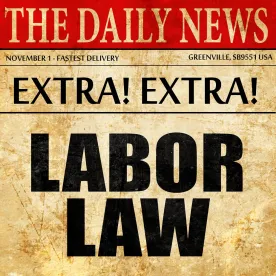Legal requirements for employers are constantly evolving, especially in New York and New Jersey where employment laws typically expand employee rights and/or increase employer responsibilities. The following are two important updates which follow this trend.
New York Digital Posting Requirements
As New York employers are keenly aware, federal, state and local laws require many different forms of notice to employees and new hires. Typically, these notices are posted at the employer’s physical location(s) in a conspicuous location on each floor of the premises. Given the prevalence of remote work, New York State has amended New York Labor Law Section 201 to require digital postings in addition to physical postings, applicable to all New York employers.
Effective immediately upon Governor Hochul’s signature on December 16, 2022, all federal and state notices which are required to be physically posted also must be provided digitally through the employer’s website or via e-mail. The law is silent on whether this requirement applies if the employer does not have a website or e-mail addresses for its employees.
The new law also requires that employers provide notice that documents required for physical posting are also available electronically. Broadly, the law also requires that all other documents required to be physically posted at a worksite pursuant to state or federal law or regulation shall also be available digitally. While local notice requirements do not appear to be covered by this new law, for consistency, we recommend that such notices also be made available digitally, in addition to physically posted.
Employers (including officers or agents who knowingly permit the corporation to violate such provisions) that fail to comply with the posting requirements set forth in New York Labor Law may be subject to penalties, including monetary fines, being found guilty of misdemeanor and/or imprisonment, depending on whether it is a first, second or subsequent offense. Accordingly, New York employers should take prompt steps to ensure that all legally required notices are posted physically and digitally and to notify employees that they can access such documents electronically. Such notices may be available on the government websites in an electronic form, or employers may wish to subscribe to a reputable service to provide updates.
Companies Planning Force Reductions Take Heed: New Jersey WARN Act Amendments Take Effect April 10, 2023
As recently reported, the New Jersey legislature had passed a bill that would implement amendments to the WARN Act originally passed in January 2020 but delayed for over two years due to the pandemic. The bill implementing those amendments was signed by Governor Murphy on January 10, 2023 making the amendments effective 90 days from the date of enactment – April 10, 2023.
In light of the firm effective date for the long-awaited and significant NJ WARN amendments, we encourage employers contemplating a mass layoff, transfer of operations or termination of operation to review the impact of the amendments, which will increase and broaden employers’ obligations in several ways. As previously reported, some highlights of the amendments are as follows:
More Employers Impacted – The amendments eliminate the distinction between full-time and part-time employees, making NJ WARN applicable to all employers of 100 or more employees regardless of hours worked or length of tenure. The current full-time and part-time distinction is also eliminated for the purpose of determining coverage. Whereas a plant closing, operations transfer, or mass layoff is currently required to meet a certain threshold number of full-time employees terminated, the amendments make NJ WARN applicable in all instances resulting in the termination of 50 employees.
Locations Are Aggregated – The amendments will broaden the definition of “establishment” to include all of an employer’s NJ locations operating for longer than 3 years, whereas previously it was defined as a single site or a group of related (contiguous) locations.
Increased Timing of Notice – The amendments increase the timing of required advance notice before the employment action from 60 days to 90 days. The persons and entities who must be notified remain (1) each impacted employee, (2) the chief elected official of the municipality where the employer is located, and (3) the Commissioner of Labor and Workforce Development.
Mandatory Severance Requirements – Even when proper notice is given, the amendments require employers to provide one week of severance pay for each year of completed service to employees impacted by a covered action.
Severance Penalty – An employer must pay each impacted employee an additional 4 weeks of severance if it does not provide proper notice of layoffs.
Although the amendments finally seem to be heading towards implementation, some uncertainties remain. A legal challenge threatens to invalidate the law’s severance requirement. A federal lawsuit titled The ERISA Industry Committee v. Asaro-Angelo, No. 3:20-CV-10094 was recently filed in the District Court for the District of New Jersey asserting that the federal Employee Retirement Income Security Act of 1974 (ERISA) “expressly preempts” the NJ WARN amendments and seeking to enjoin enforcement of the amendment’s requirements. We will continue to monitor the preemption challenge to the NJ WARN amendments.
Further, it is not clear whether the new 90 day notice requirement would apply to covered terminations that occur during the 90 day period following the April 13th effective date, even though notice of such terminations would need to be given prior to the effective date of the amendments. For example, if covered terminations occur on May 1, 2023 would notice be required 90 days prior on January 31st (per the NJ WARN amendments) or 60 days prior on March 2nd (per the current law)? Employers should consult with legal counsel and consider whether it is practicable or advisable to provide the additional notice, given the uncertainties.
The amendments to NJ WARN significantly increase employer obligations for covered actions, not only beyond current state obligations but also beyond many federal WARN Act requirements. It is advisable for employers to consider how these changes may impact their business when contemplating a reduction in workforce.




 />i
/>i

